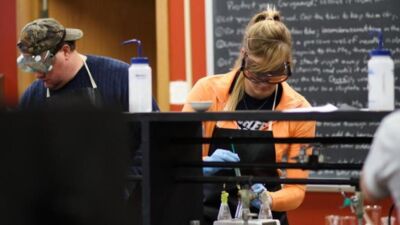Studying life’s basic processes with a biochemistry degree

Biochemistry – an interdisciplinary major that combines aspects of biology and chemistry into a unique, much different field, focuses on the study of life at its most basic level. At Concordia Nebraska, biochemistry majors use chemical principles to solve biological problems and gain the skills necessary to pursue post-graduate employment or education in numerous areas.
For students interested in careers that form a bridge between topics in both biology and chemistry, as well as those who want to take courses that integrate the two, biochemistry programs are the place to begin their search. At Concordia Nebraska, biochemistry students take courses in general biology and chemistry, mathematics and physics, courses specific to biochemistry and many electives.
In addition to the core biochemistry curriculum, students interested in attending professional school can take part in one of many pre-professional programs whose course suggestions align directly with the most common requirements for graduate school in a particular field. Most courses in the pre-medical, pre-nursing and pre-physical therapy programs are also required by or options in the biochemistry major.
Post-graduation, students with their bachelor’s degree in biochemistry are met with a wealth of options for specialized careers, graduate study and research. From preparing students to attend medical school or nursing school to pursuing a master’s or doctoral degree in nutrition, biomedical research or chemical engineering, a biochemistry degree serves as the starting point for many lucrative careers.
Undergraduate students in biochemistry spend extensive time working hands-on in laboratory environments; the same is true for graduate students in the field. As a biochemistry graduate student, you will have the chance to study specialized topics like toxicology, genetics and bioinformatics. You may conduct independent laboratory research as part of a master’s thesis or doctoral dissertation.
Professionals who hold graduate degrees in biochemistry or a related field can pursue employment as collegiate professors, research scientists, pharmacists or biomedical engineers. Typically, these are well-paid positions, with median salaries falling between $70,000 and $100,000 – or more – annually.
For students who want to enter the workforce after college, becoming a research assistant, laboratory technician or data analyst can provide continued job growth and exciting opportunities for years to come. Working in any career in biochemistry, however, requires employees to maintain critical thinking and problem-solving skills, as well as a great attention to detail. As a biochemistry major at Concordia Nebraska, however, you’ll have ample experience exercising these skills prior to graduation!
If you’re wondering whether studying biochemistry could be the right path for you, consider your skills: are you a focused, hardworking student who loves to solve detailed problems? Then, consider your goals: does the idea of working in a laboratory excite you? Are you interested in furthering medicine, human nutrition or biochemical research? If so, biochemistry is an area of study where your skills could find a home and you could feel that you’re working toward achieving your professional goals.
The biochemistry major at Concordia Nebraska is designed to teach students to study life at its most fundamental level and solve biological problems using chemical principles. Using chemistry, biology, mathematics and physics in an interdisciplinary manner, biochemistry majors will gain ample hands-on and in-class experience providing them with a lucrative skill set. Learn more about the major here.
Interested in biochemistry at Concordia University, Nebraska?
Related Stories


